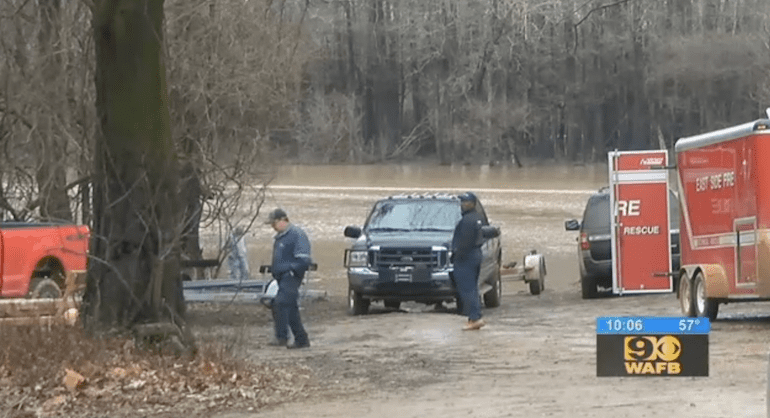Hunters heading into the great outdoors should expect the best and plan for the worst.The outdoors is unpredictable; a million things can go wrong. At the least, let someone know where you’re going and when you’re due back. Carry a tourniquet and a basic first aid kit. And never become complacent. wistv.com:
The Adams County Sheriff’s Office reported it received the first calls around 6:30 a.m. about a possible drowning on the Buffalo River in the Fort Adams area [Louisiana] . . .
Deputies said four people were getting off one boat into a second boat being used as a duck blind on the river when the second boat capsized. One of the hunters got out safely and has been assessed by medics.
Search and recovery efforts found the bodies of a man, his sister-in-law, her child, and a dog that are believed to have gotten trapped under the boat and blind . . .
Officials said the blind was in an area of the river that’s about 7 feet deep, and approximate the temperature of the water to be about 49 degrees Sunday morning.
It is unknown whether they had on life jackets.
As with armed self-defense, it’s not enough to be ready to deal with a potential threat in the wild, which can include predators (two and four-legged), hypothermia, sickness, injury, drowning and more. You have to anticipate problems. Plan for them. Look for them.
Hunting is a relatively safe pursuit. But relatively doesn’t mean absolutely. Keep that in mind. Meanwhile, our condolences to the family.





Life jackets don’t really help if you capsize, but swimming skills sure do.
In cold water life jackets count for a hell of a lot more that swimming skills. They count even more if you are injured, in a swift current or you cant get onto a bank. Or better yet, there really help if you have a bunch of gear on.
Sorry pet peeve of mine. I’m a very good swimmer and I hate it when people think that is going to save their lives when something goes wrong on a boat
I tend to agree.
Water that cold will sap your strength quickly.
Growing up in the U.P. of Michigan and spending a lot of time around Gitchigumi we were told two things. 1) If you ended up in the water, even in the summer, you’d be out of strength and probably already have drowned in 15 minutes or so without a life preserver and 2) the lake never gives up her dead. (We swam in the lake a lot and never believed this as kids but these days I tend to think 15-20 minutes probably is reasonable out in the open water.)
With small boats it’s a bit of a toss-up I think. A capsized but not sinking aluminum hulled boat can be a real devil to get out from under while wearing a life preserver. OTOH, not wearing the preserver means injuries, unconsciousness or prolonged time in the water after escape are probably going to be lethal.
Ya pays your money and takes ya chances. Personally I lean towards the PFD when boating. I do think it would be nice to get one of the ones like they have on airplanes though. You know, where you pull down on the red tab to inflate it once you’ve gotten clear…
Good advice! However, I’m not sure that Gitchigumi *never* gives up its dead. Isn’t that only when the skies of November turn gloomy?
Inflatable PFD
http://www.cabelas.com/catalog/browse/inflatable-life-jackets/_/N-1100590/Ns-CATEGORY_SEQ_104399280
Defens:
That’s what the song says but the truth is that people lost in Superior are very nearly never found. In fact, in all the years I lived up there I can’t think of anyone lost in the actual lake that was ever found. Some guys got lost in the Portage (between Houghton and Hancock, Google Street view the area) and were never found.
Bodies just don’t float. They go to the bottom and they stay there until they’re a skeleton.
I’m not saying you shouldn’t wear a life jacket. You should always wear a life jacket if you’re on water that’s deeper than you are tall.
I’m with you on the pet peeve of PFDs. I always shake my head when someone says “can’t you swim” when they see my PFD. Water near freezing, current flowing, injury, so many possibilities. I want all the possible chances I can get.
I find it really sad when parents don’t wear them or worse yet don’t have young people wear them. We lose several people locally each year when they are shocked by the cold water and the current.
I fell in a lake one spring break in high school. I was glad to have a life jacket on. I couldn’t breath with my head above water, much less swim, because the temperature change was so drastic.
Since this was a river and the bodies were found under the boat, it sounds as if the boat sank and pinned them to the bottom.
Swimming skills or a life jacket wouldnt help in that case.
It had a hunting blind on top, which probably kept them from escaping when it rolled over.
Sound like getting into a tent on a small boat is an example of Darwinism in action. I just looked online about that, WOW what a death trap.
floating hunting blinds are the de rigour standard down in bayou country.
Ban boats
That is terrible.
The title made me think they were hunting with explosives or something.
Damn shame about the dog…
Life preservers are great in open water, especially if one is unconscious. Not so much if trapped under a capsized boat or in a sinking aircraft.
Getting into what is essentially a tent in a small boat is up there with climbing a tree with a chambered gun. At some point you just have to wonder about hunters.
You may be surprised but its actually a lot easier to swim down or exit a capsized boat or vehicle with a PFD on than most people would think.
I have done underwater egress boat training “dunker school” where they put you in a enclosed boat simulator that goes to the bottom of the pool and rolls over and you have to get out and swim back to the surface. We did both with and without PDFs and it was about the same each time, which is not that hard if you have the necessary underwater confidence.
My friends and I would also challenge ourselves and each other to swim to the bottom of the 10+ ft deep pool with a PFD on and it can be done. (The trick is too kick and stroke as fast as you can)
Pull cord inflatable PFDs are great, both because they are light weight and low bulk, and in the event of something like this you can activate it after you are clear of the boat. Only problem is if you get knocked unconscious or otherwise disabled then its basically useless.
That is a very sad situation. As noted, you really need to stay attentive and prepared when you’re doing something that’s even a bit out of the ordinary.
A couple of years ago in Puget Sound, a gentleman died of hypothermia, wearing a dry suit, while acting as a rescue victim in a dive training class! He’d been in the water for an extended time, being rescued in various scenarios. Apparently, his condition wasn’t being monitored properly, and as he slowly became colder and less responsive, nobody noticed. Once they figured out something was amiss, he was too far gone to revive – with rescue personnel on site. Cold water is a fast killer.
I was taught the “50-50” rule. You have a 50-50 chance of surviving for 50 minutes in 50 degree water.
That’s a decent rule of thumb. Specifics depends on the circumstances, of course. Assuming there’s no injury with blood loss or affecting perception or motor skills, you’re looking at about an hour before you go under at that temperature, either from exhaustion or from hypothermia.
Factors like swimming ability, body size and build, cold tolerance, shivering response, body fat, alcohol, current/rapids, will to live, etc. can buy you maybe another hour, if those factors are in your favor.
Beyond that, you need a passive flotation device to survive another hour+ longer, because you’ll be unconscious for that period. Anything more and you’re on borrowed time waiting for your heart rate to slow, then stop.
I looked it up and that river reportedly runs around 42 degrees F this time of year. That’s a tough temperature to do even standing on dry land, let alone in water.
Wow, I had no idea that you could last that long in 50 degree water. I jumped into a 52 degree pond one time and could not believe how awfully cold that water was. Even though I was only in the water for maybe 1 minute and the outside temperature was over 80 degrees, I was still shivering for a bit after getting out.
I bet if we did the stats far more people are killed on the way to or from a hunt in vehicle incidents. Hunting is safe. Driving ain’t.
Ask Jim Cirillo. He survived stuff that would have scared Chuck Norris. Only to die in a car accident.
http://www.natchezdemocrat.com/2018/01/28/three-people-drown-in-wilkinson-county-boating-accident/
More info.
The blind that they were in was like a cage. When it flipped, they couldn’t find their way out of it underwater.
Tent + small boat + freezing water. Yes hunting is safe.
Safer than driving to work every day.
I get it. You’re not a fan of hunting or hunters. But you, like the rest of the anti’s, paint with too broad a brush.
I mean, hunting is reasonably safe in the same way that flying is reasonably safe… until poor decisions start piling up.
That’s true of nearly any activity.
Rescue squad taught me a 50 year old, has a 50-50 chance of swimming 50 yards in 50 degree water. Real odds are more like 70-30 you will not survive.
My hometown. Did not know them but they were relatives of friends.
I am an advocate of PFDs. Always wear them and insist my family members do also. This was just a tragic accident. PFDs would not have mattered. The duckblind pinned them under water.
Kinda sounds like Roy Halliday & his Seaplane. Shallow water, Upside down, cockpit hinged to flip up. This blind thing seems to have had the same trapping effect. A PFD should be worn by all on the water, no matter the boat size.
Another clickbait title. This wasn’t a hunting accident. It was a boating accident.
So, a story about a boat capsizing includes an editorial comment about carrying tournequets???
Comments are closed.